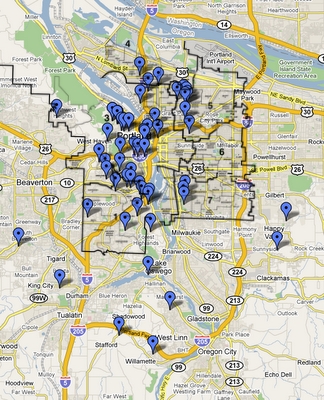Who Funded Pam Knowles’ Election?
July 12, 2009
This article is reprinted with permission. It originally appeared on the author’s blog Global Ideologies in Education –Ed.
Portland Business Alliance COO Pam Knowles recently won a seat on the PPS school board. She ran against Scott Bailey in a high-price race for the zone 5 seat. Knowles spent $34,030 on her campaign and Bailey spent $33,561 to publicize his candidacy. This begs a few questions: does this de facto “pay to play” policy lock out particular communities, viewpoints, or opinions? Who can raise $30,000 for a high-involvement volunteer position while maintaining a job and raising a family? These questions become even more relevant when considering the election process in Portland: anyone can vote in any zone’s election. (See also this open thread for previous discussion of these issues. –Ed.)
The election process has turned into a media campaign complete with campaign managers, corporate donations, media budgets, and the presentation of false statistics (more on this later; let’s just say Knowles either has no idea what she is talking about or is knowingly misleading the public).

Location of Pam Knowles’ campaign donations larger than $100
The map above shows the sources of 57 donations to Knowles’ campaign. Several of them are in her district, but the vast majority aren’t even on her side of the river. All of this information is available here through OreStar, Oregon’s election reporting website. These 57 donations account for around $15,000 of Knowles’ $34,030 campaign; the other donations were less than $100 apiece and do not require documentation. I have no doubt that Knowles had the support of some people in her district — some of those sub-$100 donations were from voters in her district — but she certainly pulled in her biggest chunks of funding from the West side (and Portland businesses).
What is Knowles saying that makes the business sphere take note? First, Knowles claims we have a 42% dropout rate. She pushes for “stabilizing funding” for the schools without calling for taxes on businesses (she’s also the COO of the Portland Business Alliance; do you think they like the new tax hikes?). She practically screams efficiency and accountability in the voters’ pamphlet — all while suggesting the K-8 model is here to stay because “research” says it’s better. Added insult: part of that “research” is an overt attack on teachers (they’re more “accountable” in the K-8 model). Question for Pam: why do we have the K-8 model only in one part of town while another part of town (the wealthier side) gets a 6th grade academy and then a 7/8 grade school for middle school?
The claim of a 42% dropout rate isn’t unique to Pam; the Mayor has made the same claim as well (although I informed the Mayor’s office of their error and it sounds like Sam understands the issue). I’ll elaborate on the dropout statistic soon — but I can tell you that Knowles is intentionally misleading the public or completely misinterpreted educational studies (or she never bothered to read them).
Kenneth Libby is an independent education researcher and a recent graduate of Lewis and Clark's Graduate School of Education and Counseling. He writes about national education issues, testing and philanthropy on Schools Matter and Global Ideologies in Education.
